The post The Power Of AI Making Eye Screening Easy appeared first on TheAussieway.
]]>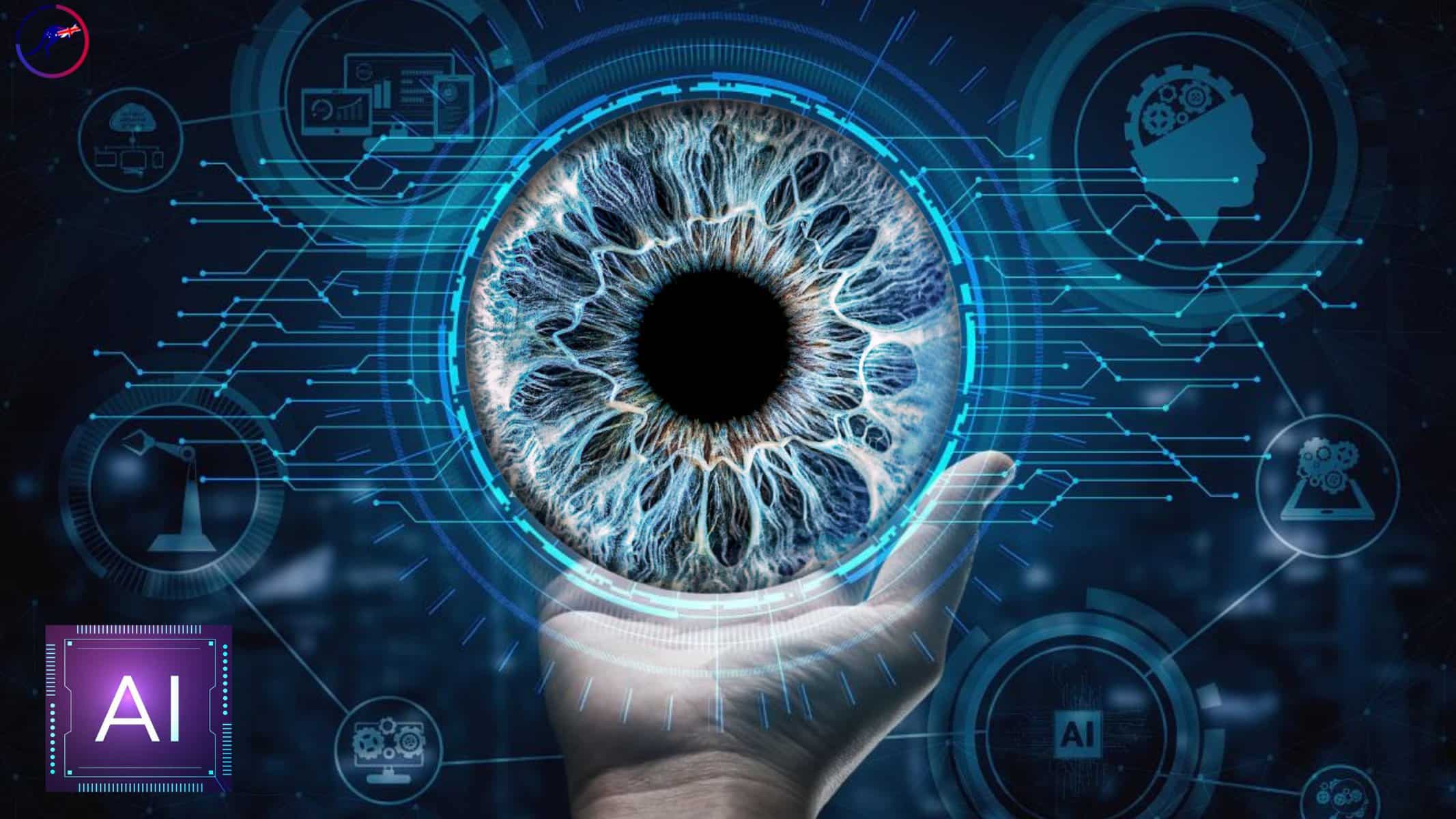
AI in Eye Making

Image Credit: https://mivision.com.au/2020/01/ai-in-the-eye-driving-solutions-for-public-health/
The impact of AI on eye disease detection is revolutionary. As healthcare practitioners leverage the capabilities of AI during eye screening, they are able to see efficient and accurate results. Apart from an early detection of eye disease it has improved eye screening procedures.
Vision loss and other serious vision problems can be avoided with early detection and treatment. For instance, diabetic retinopathy damages the blood vessels in the retina and affects approximately 30% of diabetic people; if it is not treated immediately, it can result in blindness.
Diabetes was the seventh largest cause of death in 2020, reported to the Australian Bureau of Statistics. So, Aussies, if you have diabetes, seeing a doctor twice a year can help you avoid many complicated issues like loss of vision. About 50% of people are unable to recognize that they are afflicted with this disease until it has progressed to an advanced stage.
There was room for error and subjectivity with traditional eye screening methods because they relied solely on human interpretation. However, artificial intelligence in eye care uses complex algorithms to scan enormous volumes of data from diagnostic tests and retinal imaging so AI can recognize even the smallest anomalies. Artificial intelligence can quickly identify diseases including glaucoma, retinopathy, and age-related eye disorders, and thus improve a patient’s quality of life.
AI-driven breakthrough in detecting eye conditions and improving patient outcomes:
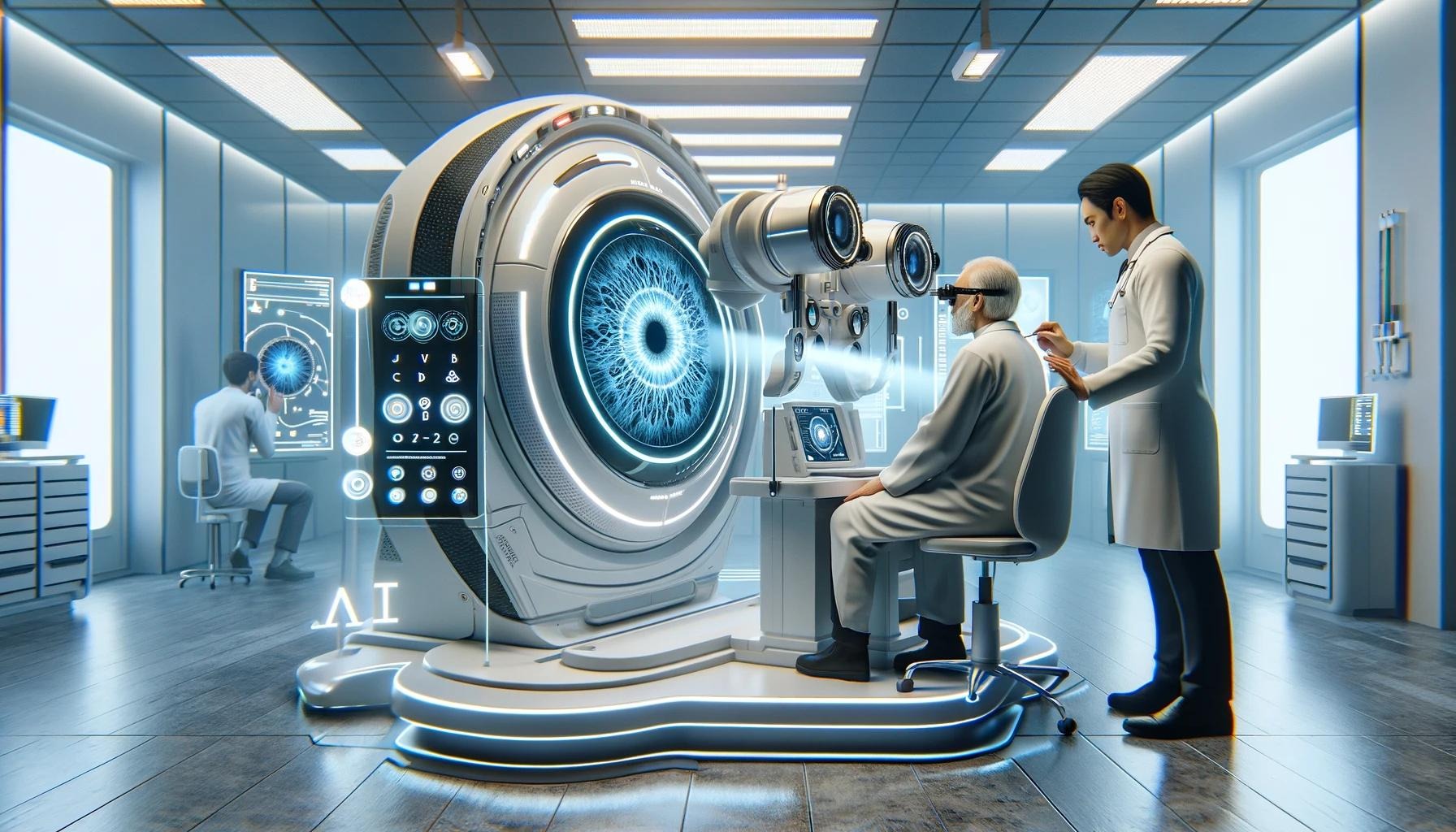
Image Credit: https://forgottenbillions.com/blog/ai-ophthalmology-revolutionizing-eye-care
Professor Mingguang He, Principal Investigator in Ophthalmic Epidemiology at CERA, says that he created an innovative method to enhance the detection of eye disease. The AI system identified the alterations brought on by age-related macular degeneration, glaucoma, diabetes, and cataracts after being trained on 70,000 retinal scans.
Additionally, the tool was evaluated in numerous real-life scenarios, and it was found to be more accurate than humans. It was incorporated into general practice, endocrinology, and many other natural settings where it provided quick referrals for additional assessment and therapy. Patients benefited as a result of numerous healthcare settings.
The Crucial Role of AI in fast and predictive healthcare
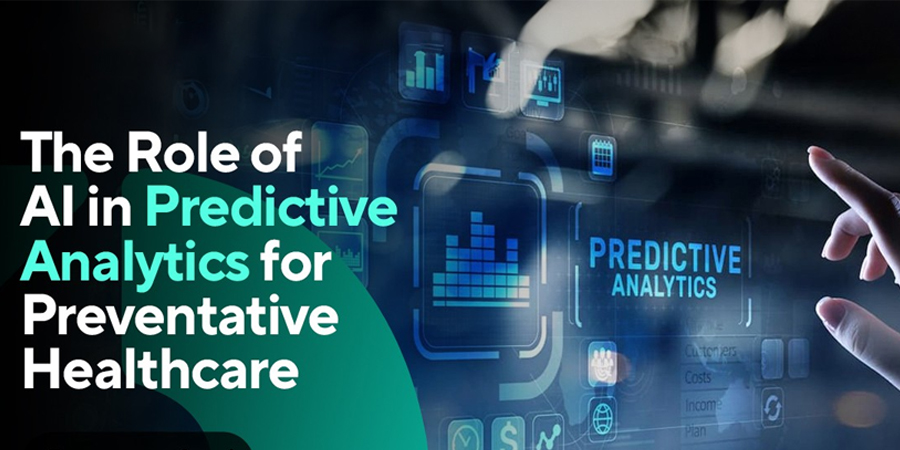
Image Credit: https://www.linkedin.com/pulse/role-ai-predictive-analytics-preventative-healthcare-manentia-ai-kkrhc/
The healthcare sector is transitioning to proactive and predictive care, which has made AI for eye disease diagnosis priceless. Predictive analytics enabled by AI and other artificial intelligence clinical techniques allow early identification and management of eye illnesses.
By analyzing large datasets, artificial intelligence (AI) provides preliminary warning signs for specific eye conditions. This also highlights warnings for illnesses like sepsis and convulsions. Making decisions regarding the necessary care, treatments, and trends that may influence treatment options is assisted by machine learning algorithms. Therefore, clinicians are informed about the dangers and the type of patient care that will be required in advance. Significant findings are made as a result of data analysis, which also helps to build individualized treatments.
It frees up important time, allows doctors to concentrate on challenging cases, and ultimately gives each patient satisfaction with the care they receive. For patients and medical professionals alike, it is more realistic and promising than ever.
Ways in which AI will revolutionize the healthcare industry and people:
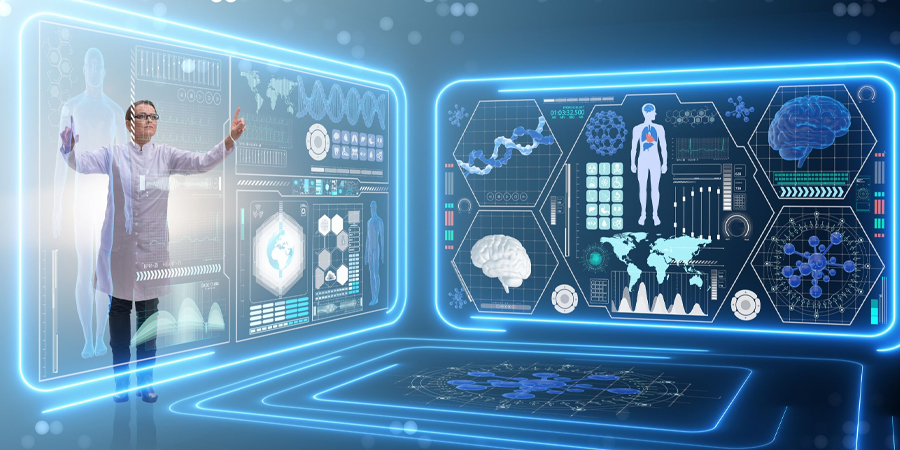
Image Credit: https://esdst.eu/future-of-ai-in-healthcare-revolutionizing-diagnosis-and-treatment/
From integrating the best diagnostics techniques to streamlining administrative procedures, AI is fundamentally changing the healthcare sector. It helps in detecting diseases earlier so patients can take necessary precautions or adopt the right treatments for improving their health. We will examine a few ways to see how AI is fundamentally altering the healthcare industry and people’s lives:
1. A Tailored Approach to Healing Using Precision Medicine
The era of comprehensive treatment approaches is over. Already in use, AI-driven precision medicine offers individualized treatments based on a patient’s genetic makeup, way of life, and medical history. AI systems can predict illness risks, recommend customized treatments, and anticipate likely negative effects by analyzing big datasets. Medical treatments will soon be as unique as the people they treat thanks to this paradigm-shifting invention.
2. Diagnoses Reimagined using AI as a Medical Detective
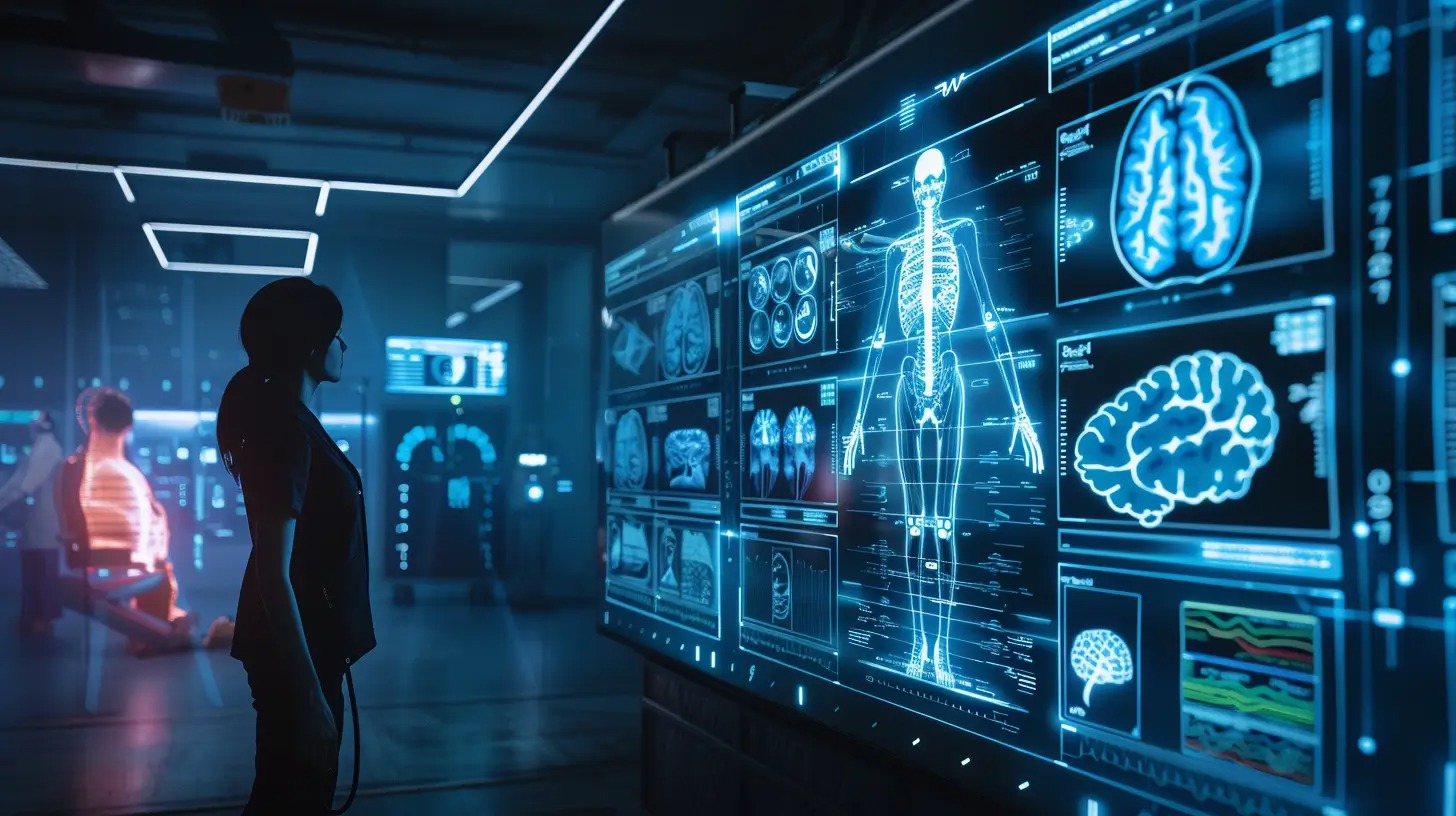
Image Credit: https://readysetrecover.com/blog/ai-and-medical-diagnosis
For a treatment to be effective, a diagnosis must be established swiftly and precisely. When examining medical images such as X-rays, MRIs, and CT scans, even the most skilled experts may overlook minute patterns and hints that AI algorithms can find. What happens in the end? Medical teams can act swiftly and decisively when diagnoses are established more rapidly and precisely.
3. AI as the Virtual Doctor in Remote Healthcare
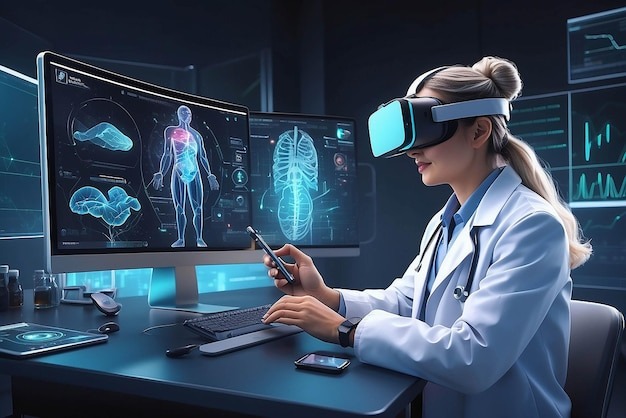
Thanks to chatbots and virtual assistants powered by AI, geographical boundaries are being removed, medical advice is being offered, and patients are being watched remotely. These “virtual doctors” provide medical advice and see to it that patients with ongoing diseases continue to be treated. The possibility of early intervention and round-the-clock assistance improves patient welfare while lessening the strain on healthcare resources.
4. AI in Pharma: Drug Discovery at Warp Speed
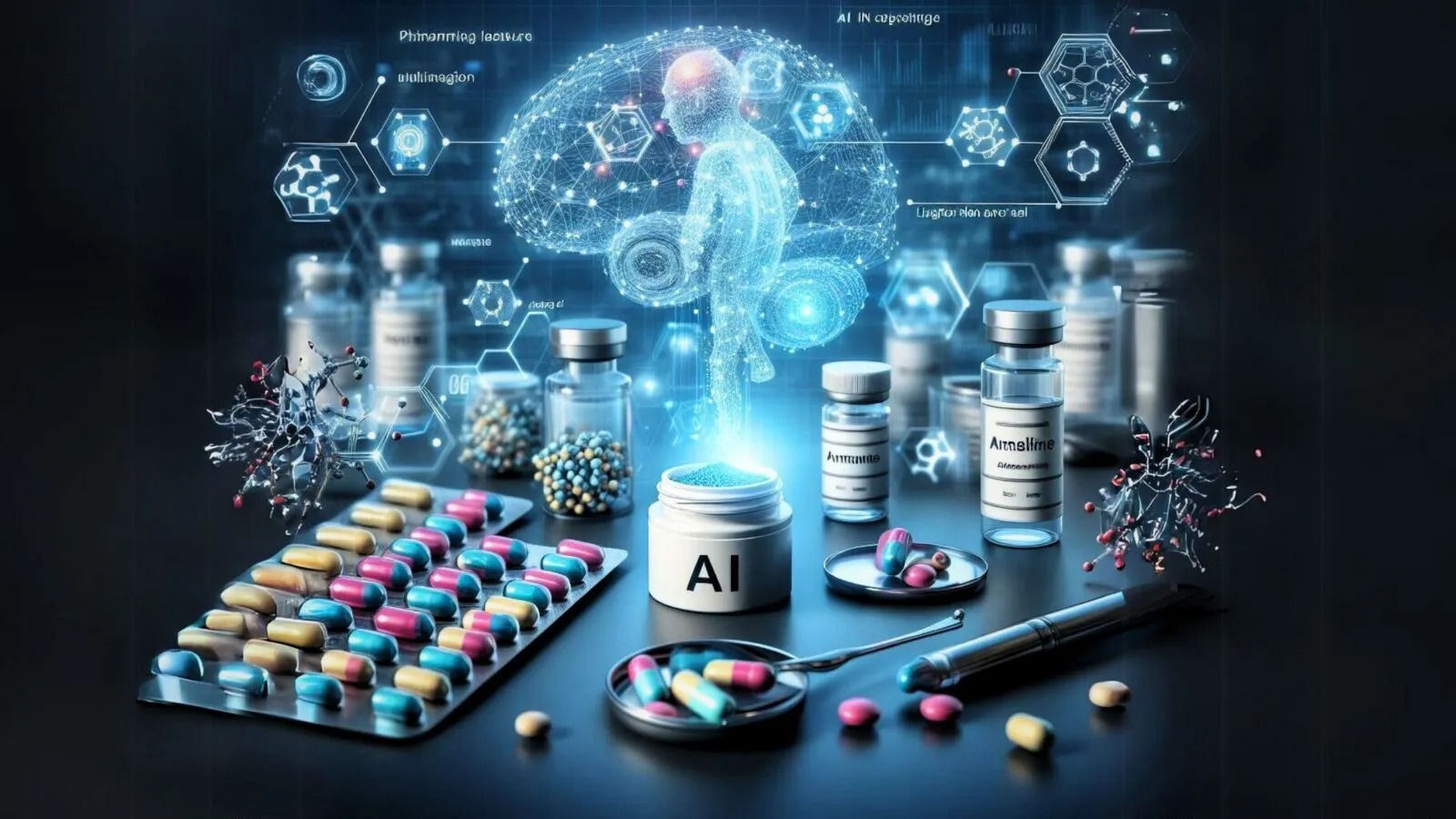
Image Credit: https://www.bwhealthcareworld.com/article/from-drug-discovery-to-delivery-ais-role-in-accelerating-pharmaceutical-innovation-548366
The traditional approach to drug discovery is expensive, time-consuming, and frequently unsuccessful. The field of pharmaceutical research is being revolutionized by AI-driven drug discovery, on the other hand. Massive amounts of data are combed through by machine learning algorithms, which hastens the identification of potential treatment possibilities and speeds up the discovery of intriguing chemicals. Because of our newly discovered speed and efficiency, we are getting closer to generating revolutionary medications and therapies for even the most complex diseases.
Through data analysis and simulations, AI is changing this environment by hastening the discovery of novel drugs. By maximizing sample size, AI additionally hastens clinical trial design, identification of the ideal patient demographics, and approval and commercialization of promising pharmaceuticals.
5. Improving Surgical Precision
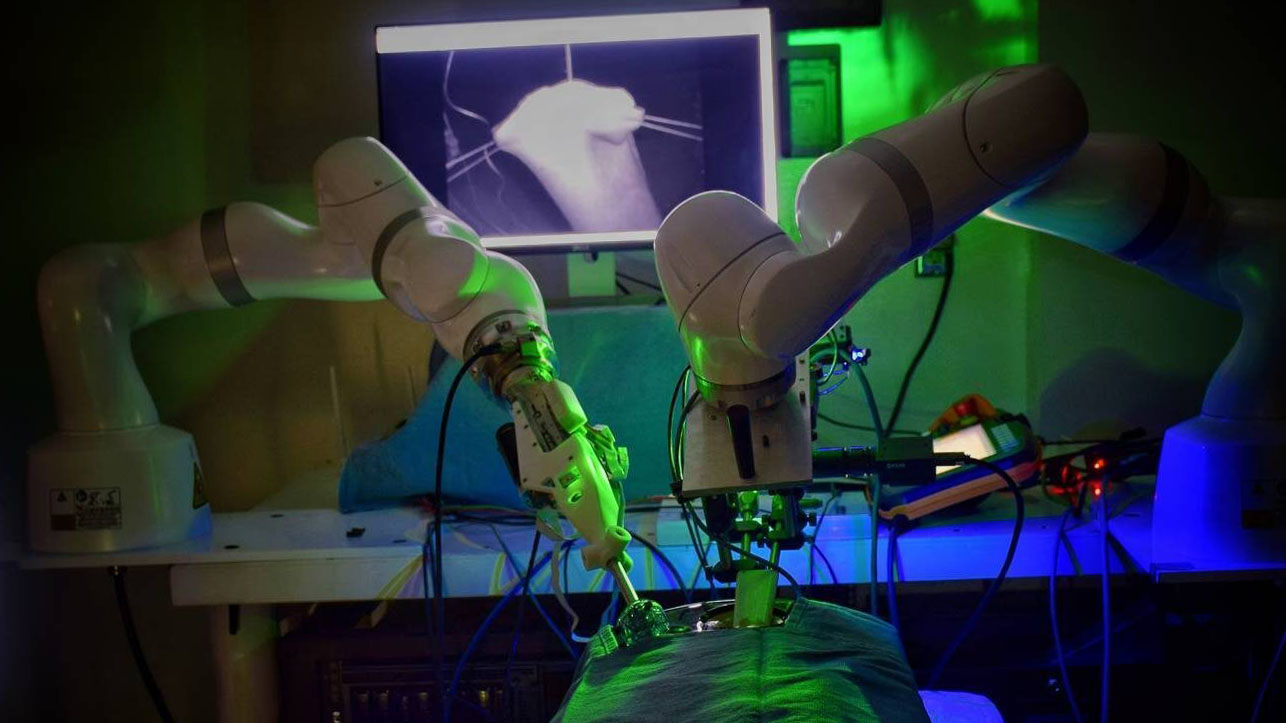
Image Credit: https://developer.nvidia.com/blog/autonomous-robot-improves-surgical-precision-using-ai/
Instead of replacing doctors’ skills, the AI Surgeon’s Assistant enhances them. Artificial intelligence (AI)-assisted robotic surgical systems offer outstanding precision, stability, and agility during difficult surgeries. Surgeons can operate with a lower probability of error and increased patient recovery rates thanks to superior vision and real-time data insights.
6. Predictive Healthcare: Prediction of Results
Instead of replacing doctors’ skills, the AI Surgeon’s Assistant enhances them. Artificial intelligence (AI)-assisted robotic surgical systems offer outstanding precision, stability, and agility during difficult surgeries. Surgeons can operate with a lower probability of error and increased patient recovery rates thanks to superior vision and real-time data insights.
7. Preventive Care and Predictive Analytics
Due to AI’s predictive powers, medical professionals can identify patients who are more prone to develop chronic illnesses including diabetes, cardiovascular disease, and asthma. By analyzing data from wearables, electronic health records (EHRs), and lifestyle choices, artificial intelligence (AI) can proactively suggest preventative actions, lifestyle changes, and personalized interventions to lower health risks. Proactive care instead of reactive care may result in better long-term patient outcomes and cost savings.
Ethical Difficulties and Prospects
Despite the immense potential of AI in healthcare, there are certain ethical concerns. Data privacy, transparency, and algorithmic biases must all be upheld if trust is to be earned and AI’s full potential is to be realized. By carefully and unwaveringly adhering to ethical norms, we may create the groundwork for a future in which AI-driven healthcare will benefit everyone.
Conclusion: The Journey Ahead
A path that offers hope, promise, and the potential to change millions of lives globally is the integration of AI with healthcare. As time goes on, embracing innovation while keeping committed to ethical issues will be the key to realizing AI’s full potential in healthcare. In the near future, there will be many exciting breakthroughs in the healthcare industry and patient lives.
Moreover, with the use of AI, eye screening has a more bright future for both patients and healthcare facilities. AI-driven screening will enable early diagnosis of eye diseases, which will not only facilitate swift action but also enhance treatment outcomes, assist in being ready for any warning indications, and enable many patients to preserve their vision. As technology advances, artificial intelligence will open up more opportunities in the field of eye care.
Although it cannot replace human intervention, it will undoubtedly work alongside humans to create a more radiant and healthier future for all.
The post The Power Of AI Making Eye Screening Easy appeared first on TheAussieway.
]]>The post The Potential of Artificial Intelligence in Improving IVF Success Rates appeared first on TheAussieway.
]]>
Key Takeaways :
- Discover the need for additional tools in embryonic screening
- Explore operator bias in Manual Embryonic Morphological Assessment
- Know about the AI-driven method, STORK-A for Predicting Ploidy Status
- Understand the Barriers to Clinical Usage of AI Tools in IVF
- Realize the Importance of Large-Scale RCTs for Validation and Regulatory Approval
For individuals battling infertility, in-vitro fertilization (IVF) is widely considered a feasible option, even though its success rates have always remained dubious.
However, things are about to change.
It’s not too far before we witness a future-bending technology like Artificial Intelligence (AI) brought to the clinical scene, especially for IVF.
Introducing STORK-A

A recent study published in The Lancet Digital Health by Josue Barnes and colleagues introduced an innovative AI-driven method called STORK-A. Reportedly, this non-invasive technique can predict the ploidy status of embryos, thereby making it easy to select healthy blastocysts for implantation.
But before we go further exploring the potential of this method, one must know that STORK-A will never be used as a replacement option for conventional preimplantation genetic testing for aneuploid status (PGT-A). Instead, it would strictly act as a complementary way to assist clinicians in their decision-making.
Furthermore, STORK-A is still largely a proof-of-concept approach, backed by one of the largest studies of its kind. Thus, any external validation will only demonstrate the integrative potential of AI under pre-decided clinical settings for embryo selection.
Since 2020, multiple studies have showcased the promise of AI tools in embryo selection. Take the Convolutional Neural Network (CNN) tool, for instance, developed by Sonya Diakiw and colleagues, which resulted in about a 12% reduction in time-to-pregnancy.
Among other notable mentions are Charles Bormann and colleagues‘ studies, where CNN outperformed 15 embryologists in accurately predicting embryos with the highest implantation potential. Such findings underscore the potential of Artificial Intelligence in Improving IVF.
Hiccups Along The Way

Despite a string of encouraging results, a bunch of barriers hinder the clinical implementation of AI tools for IVF.
Starting with the “black box effect,” which is caused by the “complexity and proprietary algorithms” that are seen in typical AI-based approaches. A good way to address this would be to opt for interpretable and transparent models to do away with hidden biases.
Furthermore, there is a lack of solid medical evidence that digital tools can actually improve IVF, which is a limitation.
Is There Any Fix?
A handful of first-base approaches have been identified to act as an immediate fix and include:
- Rigorous evaluation via high-quality Randomised Controlled Trials (RCTs) to assess the efficacy of AI-driven tools for embryo selection. A necessary doing before any regulatory approval comes through for widespread clinical adoption.
- In the absence of published RCTs evaluating AI-driven tools meant specifically for IVF, externally robust and validated approaches and subsequent validation can come in handy.
- Furthermore, it is necessary to consider the long-term health outcomes of children conceived through AI-assisted IVF. There is strong evidence that assisted reproductive technologies can lead to adverse effects for the child during the nascent and adolescent years, like cardiovascular dysfunction.
- The need for follow-up studies assessing the health of children born through AI-assisted IVF is imperative to gain comprehensive insights into any potential implications.

AI-assisted embryo selection- Diversity and Inclusivity Holding The Key

Inclusive participation across multiple trials and studies is vital to ensuring generalizability and equitable benefits.
A systematic review and meta-analysis from 2022 have already revealed the inherent disparities in IVF outcomes. especially with black women experiencing higher rates of spontaneous abortions and lower live birth rates compared to white females.
Although recent studies conducted by Hajirasouliha and colleagues offered validation across multiple populations, the disparity of race or ethnicity data of participants still remains a vital aspect for all forms of future research.
The Way Forward
Undoubtedly, the integration of AI in embryo selection for IVF holds untold potential for the future.
However, significant challenges lie ahead that will call for repeated reassuring on multiple grounds before such methods can become a part of routine clinical decisions.
Sure, large-scale RCTs encompassing diverse populations with external validation have a way out, but the current scenario calls for deep evaluation of externally validated AI approaches to establish befitting clinical value.
The post The Potential of Artificial Intelligence in Improving IVF Success Rates appeared first on TheAussieway.
]]>